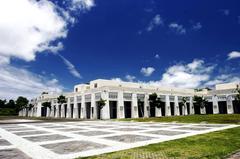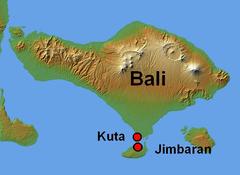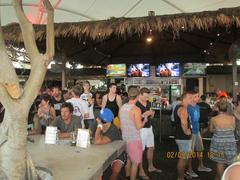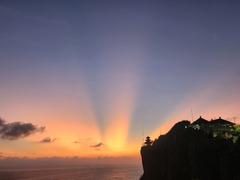Mengwi Visiting Hours, Tickets, and Historical Sites Guide – Badung, Bali, Indonesia
Date: 04/07/2025
Introduction: Mengwi’s Rich Heritage
Located in the heart of Bali’s Badung Regency, Mengwi is a remarkable gateway to the island’s royal heritage, spiritual traditions, and natural beauty. Established in the early 17th century by I Gusti Agung Putu, the Mengwi Kingdom was a formidable political and cultural force, shaping the region’s identity through its sophisticated governance, religious patronage, and enduring monuments. Central to this legacy is Pura Taman Ayun, a majestic water temple built in 1634, acclaimed for its multi-tiered shrines, lotus-filled moats, and gardens that reflect the Balinese philosophy of Tri Hita Karana—the harmonious relationship between humans, nature, and the divine.
Today, Mengwi offers visitors a vibrant mix of historical exploration, cultural festivals (such as the Mekotek ceremony), tranquil landscapes, and convenient access to other iconic Balinese sites. This comprehensive guide provides essential information on visiting hours, ticketing, travel tips, and cultural etiquette to help you make the most of your journey in Mengwi.
For more details and the latest updates, refer to trusted resources like Travel Passionate, Baliluxurytravel, and Balibelin.
Contents
- Early Origins and Rise of Mengwi Kingdom
- Pura Taman Ayun: Construction, Significance, and Visitor Information
- The Fall of the Mengwi Kingdom and Cultural Legacy
- Language, Demographics, and Religious Diversity
- Key Events and Modern Practices
- Mengwi in Contemporary Bali
- Practical Visitor Information
- Getting There and Around
- Accessibility
- Parking and Transport Tips
- Accommodation
- Essential Attractions & Activities
- Guided Tours and Special Events
- Local Customs and Etiquette
- Festival Participation
- Food, Facilities, and Safety
- Tips for a Memorable Visit
- Frequently Asked Questions (FAQ)
- Summary and Further Resources
Early Origins and Rise of the Mengwi Kingdom
Mengwi’s prominence began in the early 17th century with the founding of its kingdom by I Gusti Agung Putu. Strategically situated between Ubud and Bali’s southwest coast, Mengwi rapidly developed into a vibrant center for trade, agriculture, and religious activity. The rulers fostered the arts, supported traditional ceremonies, and built monumental temples that continue to define the region’s landscape. The Mengwi Kingdom’s influence extended across western and central Bali, often engaging in alliances and rivalries with neighboring states (travelpassionate.com; id.wikipedia.org).
Pura Taman Ayun: Construction, Significance, and Visitor Information
Historical and Spiritual Legacy
Commissioned in 1634, Pura Taman Ayun was conceived as the royal family’s ancestral temple and a spiritual center for the kingdom’s subjects. The temple’s design—marked by meru towers, a lotus-studded moat, and lush gardens—embodies Tri Hita Karana and serves as a testament to the region’s spiritual and architectural sophistication (travelpassionate.com).
The temple is integral to Bali’s UNESCO-listed subak irrigation system, reflecting the intertwining of religious practice and sustainable agriculture. Its multi-tiered shrines are dedicated to various Hindu deities and local spirits, with the tallest symbolizing Mount Meru, the center of the universe in Hindu cosmology (baliluxurytravel.com).
Visiting Hours and Ticket Information
- Opening Hours: Daily, 8:00 AM – 6:00 PM
- Tickets: IDR 20,000 for adults, IDR 10,000 for children (purchase at entrance)
- Accessibility: Mostly paved; some areas have steps. Wheelchair access is possible in outer courtyards.
- Best Time to Visit: Early morning or late afternoon for fewer crowds and optimal lighting
- Guided Tours: Available on-site and through local tour operators
- Photography: Permitted in outer courtyards; please ask before photographing ceremonies or people
For the latest details, check resources like baliluxurytravel.com and balibelin.com.
The Fall of the Mengwi Kingdom and Cultural Legacy
The Mengwi Kingdom’s autonomy ended in 1891 after defeat by the Badung Kingdom and subsequent Dutch colonial intervention. Despite political decline, the royal family restored Pura Taman Ayun in 1911, ensuring the temple’s continued religious significance. The site underwent major repairs after the 1971 earthquake and was recognized by UNESCO in 2012 for its cultural value (travelpassionate.com).
Language, Demographics, and Religious Diversity
Mengwi is home to over 130,000 residents (2021), predominantly Balinese Hindus but also communities of Christians, Muslims, Buddhists, and Chinese Indonesians. The local dialect, Basa Mengoeian, reflects colonial influences with Dutch loanwords (id.wikipedia.org). The presence of 738 Hindu temples, multiple churches, mosques, and a Buddhist vihara underscores the region’s cultural plurality.
Key Events and Modern Cultural Practices
Mengwi’s living traditions are best experienced during the Mekotek Festival in Munggu village—an exuberant display of communal spirit featuring bamboo pole rituals during the Galungan festival (indonesiaimpressiontour.com; baliuntold.com). Other notable events include temple anniversaries and processions, all deeply rooted in local cosmology and community life.
Mengwi in Contemporary Bali
Now an administrative district of 20 villages, Mengwi balances rural charm with accessibility to Ubud and Bali’s beaches (en.wikipedia.org). It remains a hub for traditional arts, religious ceremonies, and the island’s renowned subak agriculture.
Practical Visitor Information
Getting There and Around
Mengwi is approximately 18 km from Denpasar and 8 km from Ubud. Transportation options include private car, motorbike, or taxi. Public transport is limited—private drivers or ride-hailing apps are recommended for convenience.
Accessibility
While most major sites have paved paths, some traditional structures involve steps or uneven surfaces. Visitors with mobility needs should check accessibility with accommodations or tour operators in advance.
Parking and Transport Tips
Ample parking is available at Pura Taman Ayun and major beaches. Early arrival during festivals is recommended.
Accommodation
Choose from eco-lodges, boutique villas, and traditional resorts surrounded by rice paddies. Recommended options include Villa Soulshine, Balam Bali Villa, Ijo Eco Lodge, De Moksha Boutique Resort, and RedDoorz.
Essential Attractions and Activities
Pura Taman Ayun
- UNESCO World Heritage Site
- Open daily, 8:00 AM – 6:00 PM
- Entrance: IDR 20,000 (adults), IDR 10,000 (children)
- Key features: meru shrines, lotus ponds, gardens
Tanah Lot
- Iconic sea temple, 9 km from Mengwi
- Open: 7:00 AM – 7:00 PM
- Entrance: IDR 60,000 (foreigners)
- Best at sunset; access to temple only at low tide
Alas Kedaton Monkey Forest
- Sanctuary with nutmeg trees and sacred temples
- Open: 8:00 AM – 6:00 PM
- Entrance: IDR 20,000
Pengempu Waterfall
- Hidden jungle waterfall, free access, best in early morning
Mengening & Munggu Beaches
- Peaceful volcanic beaches, ideal for sunset and local ceremonies
Tanah Wuk Viewpoint
- Scenic deck with panoramic valley views
- Open: 9:00 AM – 6:00 PM; Entrance: IDR 5,000
Local Markets and Museums
- Mengwi Traditional Market: Open mornings, great for local crafts
- Museum Yadnya: Exhibits on Balinese rituals
- Subak Museum (Tabanan): Insights into Bali’s irrigation heritage
Cycle Tours and Rice Field Walks
- Guided tours of villages, rice terraces, and temples
Guided Tours and Special Events
Local operators offer cycling, walking, and cultural tours, often including transportation and expert guides. Advance booking is recommended, especially during festivals like Mekotek (next scheduled: May 3, 2025).
Local Customs and Cultural Etiquette
- Dress modestly: Shoulders and knees covered, sarong and sash required in temples (available at entrances)
- During ceremonies: Observe quietly, avoid flash photography, and seek permission before taking photos
- General behavior: Greet with a smile and the “salam” gesture; avoid loud voices or pointing
Festival and Event Participation
Participating in the Mekotek Ceremony or local temple anniversaries offers rare cultural insights. If invited to a private event, a small gift (oleh-oleh) is appreciated.
Food, Facilities, and Safety
- Warungs near attractions serve Balinese dishes at reasonable prices; fresh coconuts ~IDR 20,000
- Facilities (toilets, parking) are generally available but basic in rural areas
- Safety: Mengwi is tourist-friendly; secure valuables, beware of strong beach currents, and use sunscreen
Practical Tips for a Memorable Visit
- Carry small cash for tickets and tips
- Visit early or late to avoid crowds and heat
- Learn basic Indonesian or Balinese greetings
- Ask permission before photographing people or ceremonies
- Download the Audiala app for maps, audio guides, and insider tips
Frequently Asked Questions (FAQ)
What are the visiting hours for Pura Taman Ayun?
Daily from 8:00 AM to 6:00 PM.
How much are tickets?
IDR 20,000 for adults, IDR 10,000 for children for Pura Taman Ayun; other sites vary.
Are guided tours available?
Yes, through local operators and at major attractions.
Is Mengwi accessible for visitors with disabilities?
Some areas are accessible; check with operators or accommodations for details.
What should I wear when visiting temples?
Modest clothing; sarong and sash required (provided at entrances).
What is the Mekotek Ceremony?
A traditional stick-fighting festival held every 210 days (next: May 3, 2025) in Desa Munggu.
Summary: Mengwi’s Visitor Essentials and Cultural Value
Mengwi stands as a testament to Bali’s royal heritage, spiritual depth, and vibrant community life. Anchored by Pura Taman Ayun, visitors can explore the unique confluence of architecture, cosmology, and sustainable agriculture. Attractions range from historic temples and tranquil beaches to local markets and living traditions like Mekotek. Respect for local customs and awareness of practicalities ensure a rewarding journey through Bali’s cultural heartland.
For the most current information and personalized itineraries, download the Audiala app and browse authoritative resources like Travel Passionate, Baliluxurytravel, and Finns Beach Club Mengwi Guide.
References and Further Reading
- Travel Passionate: Pura Taman Ayun Temple in Bali
- Bali Luxury Travel: Guide to Pura Taman Ayun
- Balibelin: Taman Ayun Temple Mengwi Guide
- Finns Beach Club Mengwi Guide
- Mengwi, Badung – Wikipedia
- Festivals in Bali: Mekotek Ceremony – Indonesia Impression Tour
- Baliuntold – Events and Festivals Calendar
- Ubud Center: Taman Ayun Temple
- Wanderlog: Mengwi Attractions
- Lillagreen: Mengwi Travel Guide



